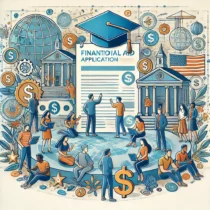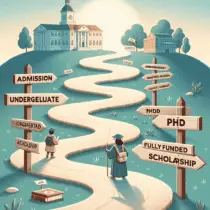International students aspiring to study in the United States often face the substantial challenge of financing their education. The cost of tuition, living expenses, and other fees can be overwhelming. However, with research and persistence, many students can find financial aid that fits their needs.
Unlocking Educational Dreams: How International Students Can Secure Scholarships in the USA
Securing scholarships is one of the most viable ways to finance education in the USA for international students. Scholarships can come from various sources, including universities, private organizations, government programs, and more.
Many universities in the United States offer scholarship programs specifically designed for international students. Colleges such as Harvard University, Stanford University, and the Massachusetts Institute of Technology (MIT) are known for their generous financial aid packages. It is worth noting that competition for these scholarships is fierce, but having a strong academic record, extracurricular involvement, and an impressive application can boost one’s chances.
Private organizations and foundations such as the Fulbright Program, The Joint Japan/World Bank Graduate Scholarship Program, and the American Association of University Women (AAUW) also offer scholarships to international students. The Fulbright Program, for example, is a highly prestigious scholarship that provides funding for students, scholars, and professionals to undertake graduate study, advanced research, and university lecturing in the USA.
Additionally, there are scholarships that target specific demographics, such as the International Peace Scholarship which supports women from around the world pursuing graduate degrees in the United States.
Researching Available Opportunities
To find scholarships, international students should start by researching the financial aid offerings of the institutions they are applying to. Most universities have dedicated financial aid offices and websites that detail the specific scholarships available to international applicants.
Websites such as Fastweb, Scholarship Portal, and EducationUSA also compile databases of scholarships that can be searched by various criteria, including nationality, field of study, and degree level. These resources can be invaluable in identifying potential funding sources.
Another useful strategy is to reach out to the international office or financial aid office of the colleges or universities being considered. These offices can provide personalized assistance and help navigate the complexities of applying for financial aid as an international student.
Understanding Loan Options
Sometimes, scholarships and grants might not cover all expenses, and international students might need to look into loan options. However, accessing student loans in the United States can be more challenging for international students compared to domestic students.
Federal student loans are typically not available to international students. However, there are private lenders who offer loans to international students, often requiring a U.S. citizen or permanent resident as a co-signer. Companies such as Prodigy Finance and MPower Financing specialize in providing loans to international students without requiring a co-signer.
Work Opportunities and Assistantships
Another viable option for funding education in the USA is through on-campus jobs and assistantships. While international students are generally limited to working 20 hours per week during the academic year, this employment can significantly offset living expenses.
Research and teaching assistantships are often available for graduate students, providing a stipend and sometimes tuition waivers in exchange for work conducted at the university. Positions might involve teaching undergraduate classes, assisting professors with research, or administrative duties.
Getting Help from Home Country
Some international students might find financial assistance through scholarships, grants, or loans offered by their home countries. Government programs, private organizations, and companies within a student’s home country may provide funding to support study abroad.
For instance, the $12,000 DAAD Helmut-Schmidt-Programme in Germany is an example of such opportunities, even though it is not directly related to the USA. Programs like this can sometimes be found with applicable benefits related to or in cooperation with study in the United States.
Navigating the Application Process
Applying for financial aid as an international student requires careful planning and organization. Most colleges have specific deadlines for scholarship applications, which might differ from admission deadlines. It is crucial to keep track of these deadlines and ensure all documents are submitted on time.
Application requirements for scholarships can vary widely but typically include academic transcripts, letters of recommendation, and personal statements. Some scholarships might also require interviews or additional tests such as the TOEFL or IELTS for English language proficiency.
For international students, understanding and fulfilling visa requirements are also part of the process. The F-1 student visa is the most common for academic studies in the USA, and students need to show proof of sufficient funding to cover their studies and living expenses as part of the visa application.
Building a Strong Application
In securing scholarships, the quality of the application can make all the difference. Key elements of a strong application include:
- Academic Excellence: High grades and test scores can showcase a student’s dedication and ability.
- Extracurricular Activities: Involvement in extracurricular activities, leadership roles, and community service can highlight well-roundedness.
- Personal Statement: A compelling personal statement that clearly communicates goals, achievements, and how the scholarship will help achieve those aims.
- Letters of Recommendation: Strong letters from teachers, professors, or professionals who know the applicant well and can vouch for their qualifications and character.
Additional Tips and Advice
- Start Early: Begin the search for financial aid and scholarships well in advance.
- Stay Organized: Keep track of deadlines and documents needed for each application.
- Seek Help: Utilize resources such as EducationUSA advisors, school counselors, or the financial aid office at prospective schools.
- Network: Join forums, groups, or social media communities of international students who share tips and experiences.
- Be Persistent: Do not get discouraged by rejections. Keep applying to as many relevant scholarships as possible.
Summary
Navigating financial aid as an international student in America is undoubtedly challenging but not insurmountable. By leveraging scholarships, loans, work opportunities, and resources both in the USA and from their home countries, students can unlock educational dreams and secure the funding needed for their studies.
Understanding the landscape, researching available opportunities, and meticulously preparing applications are essential steps. With determination and perseverance, international students can find the financial support needed to achieve their academic ambitions in the United States.






